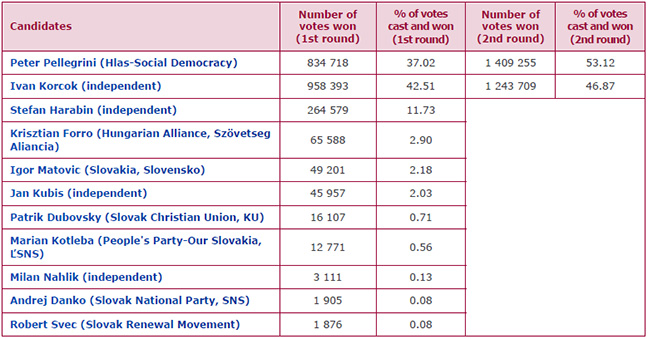Results
Elections in Europe
Corinne Deloy
-

Available versions :
EN

Corinne Deloy
Peter Pellegrini (Hlas-Social Democracy) won the 2nd round of the presidential election in Slovakia on 6 April. The current President of the National Council of the Republic (Narodna rada Slovenskej republiky), the single chamber of parliament, and former Prime Minister (2018-2020), supported by Prime Minister Robert Fico's party, Direction-Social Democracy (SMER-SD), he won 53.12% and his opponent Ivan Korcok, former Minister of Foreign and European Affairs (2020-2022), supported by Michal Simecka's Progressive Slovakia (PS), Milan Majersky's Christian Democratic Movement (KDH), Richard Sulik's Freedom and Solidarity (SaS), Jaroslav Nad's Democrats (D), Mikulas Dzurinda's European Blue Slovakia (M) and Ondrej Dostal's Civic Conservative Party (OKS), 46.87%.
In the 1st round of voting on 23 March, Ivan Korcok won 42.51% of the vote, ahead of Peter Pellegrini who won 37.02%.
Peter Pellegrini won in seven of the country's eight provinces, with the exception of Bratislava, where Ivan Korcok won 65.97% of the vote (34.02% for Peter Pellegrini). Seven out of ten voters (71.6%) fulfilled their civic duty in this province.
Turnout was 61.14%. This was higher than the turnout in the 1st round (+9.24 points) but also higher than the turnout recorded in the 2nd round of the previous presidential election on 30 March 2019 (+2.93 points). This is in fact the second highest turnout since 1999, the year of the first election of the President of the Republic by direct universal suffrage in Slovakia.
Results of the presidential elections of 23 March and 6 April 2024 in Slovakia
Turnout: 51.90% (1st round) and 61.14% (2nd round)

Source : https://www.volbysr.sk/sk/vysledky_hlasovania_kolo2.html
"I want to be a president who defends the interests of Slovakia (...) I will be the president who supports the government in its efforts to improve the lives of Slovaks, and I will do everything to ensure that Slovakia always remains on the side of peace, not war," declared Peter Pellegrini when the results were announced. "The Slovak political scene is divided between those who are in favour of continuing the war at all costs and those who demand the start of peace negotiations. I belong to the latter category".
Foreign policy, and in particular the war in Ukraine, was a major issue in the election campaign. Prime Minister Robert Fico is in favour of an immediate ceasefire between Moscow and Kyiv and the organisation of peace talks with Moscow. He recently said that Vladimir Putin had been "unjustly demonised" and that Ukraine's admission to NATO would mark the start of a third world war. As soon as he came to power following the last parliamentary elections on 30 September 2023, as he had promised during his election campaign, he cut off his country's military aid to Ukraine, limiting support for his neighbour to humanitarian and civilian aid.
Peter Pellegrini's victory undeniably strengthens the power of Prime Minister Robert Fico, who wants to reform the judicial system and exercise greater control over the media. "The government can count on the fact that, as long as it fulfils its programme, it does not have to fear that the presidential palace will become a centre of opposition that would harm it, as has been the case in the past," declared Peter Pellegrini the day after his election.
"This presidential election is a kind of plebiscite on the preservation of liberal democracy in Slovakia and on the future direction of foreign policy (...) If Peter Pellegrini is elected, the process of disintegration of liberal democracy will proceed rapidly and without major obstacles. The election of Peter Pellegrini will strengthen the grip of Robert Fico and his government coalition on power, paving the way for further politicisation of the judiciary. This at a time when Robert Fico is already being accused by some commentators of 'trying to create a mafia state'," said Grigorij Meseznikov, President of the Institute of Public Affairs. "With Peter Pellegrini as President of the Republic, the government's approach will only become more pronounced because there will no longer be any checks and balances," said Aneta Vilagi, a political scientist at Bratislava's Comenius University.
Peter Pellegrini, 48, comes from Banska Bystrica, a town in the centre of the country, and holds a degree in economics from Matej Bel University of this town. He began his professional career as a parliamentary assistant in 2002. In 2006, he was elected Member of Parliament on the Direction-Social Democracy ticket. Since 2012, he has held a number of ministerial posts: Education, Science, Research and Sport; Investment and Digital Technologies. In 2018, he was appointed Prime Minister after Robert Fico resigned following the political crisis sparked by the murder of journalist Jan Kuciak and his partner Martina Kusnirova at the end of February 2018[1]. Peter Pellegrini led the government for two years. In 2023, he became President of the National Council of the Republic following the parliamentary elections on 30 September.
Peter Pellegrini will be officially sworn in as President of the Slovak Republic on 15 June next.
On the same theme
To go further
Elections in Europe
Corinne Deloy
—
6 May 2025
Elections in Europe
Corinne Deloy
—
29 April 2025
Elections in Europe
Corinne Deloy
—
29 April 2025
Elections in Europe
Corinne Deloy
—
15 April 2025

The Letter
Schuman
European news of the week
Unique in its genre, with its 200,000 subscribers and its editions in 6 languages (French, English, German, Spanish, Polish and Ukrainian), it has brought to you, for 15 years, a summary of European news, more needed now than ever
Versions :



